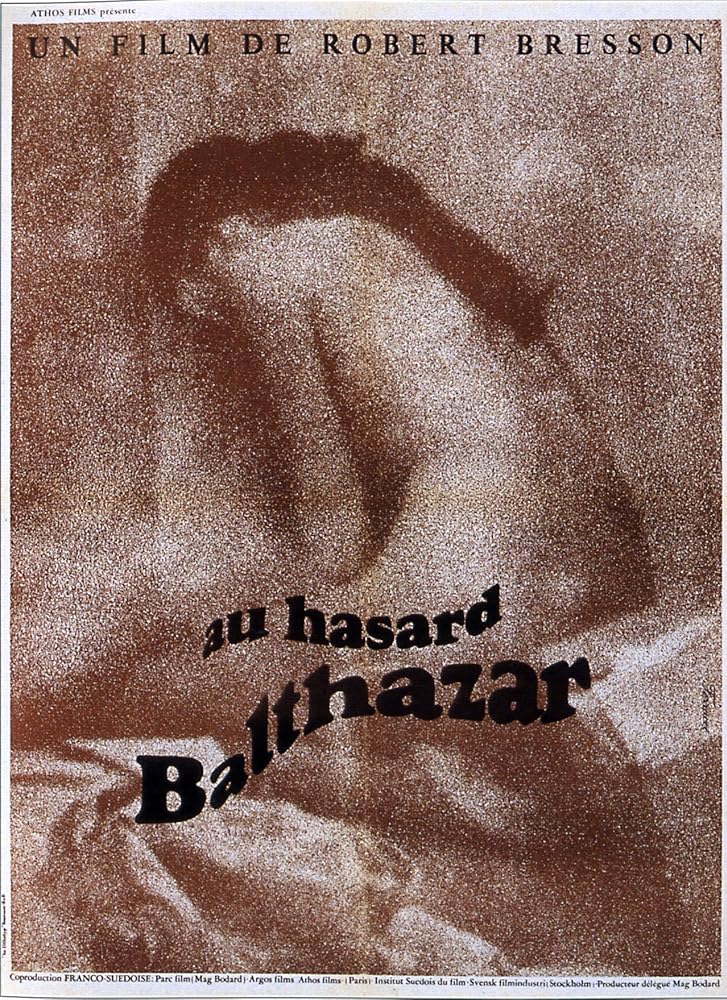
AU HASARD BALTHAZAR
(director/writer: Robert Bresson; cinematographer: Ghislain Cloquet; editor: Raymond Lamy; music: Jean Wiener; cast: Anne Wiazemsky (Marie), François Lafarge (Gerard), Philippe Asselin (Marie’s father), Nathalie Joyaut (Marie’s mother), Walter Green (Jacques), Jean-Claude Guilbert (Arnold), Pierre Klossowski (Merchant), François Sullerot (Baker), M.C. Fremont (Bakers wife); Runtime: 95; MPAA Rating: NR; producer: Mag Bodard; Criterion; 1966-France-in French with English subtitles)
“Bresson’s greatest masterpiece.”
Reviewed by Dennis Schwartz
Bresson’s greatest masterpiece, one of the best films ever made, is an astonishing (and I do mean astonishing) simple tale about innocence and purity in the harsh world of reality. It’s a profoundly heart-breaking human-nature drama about animal as the holy one. This stark parable features a donkey in rural France who is given the name of Balthazar (one of the Three Wise Men) by his gentle first keeper Marie, daughter of a recalcitrant teacher prone to making the same mistakes over and over. As Balthazar’s passed onto different owners he will be a witness to mankind’s cruelty as well as being a victim (receiving beatings and having tricks played on him–firecrackers tied to his tail and set off). Balthazar takes mankind’s ignorance in with a reserved calm and silence, not understanding what is happening but remaining grounded in his pure nature as a noble beast of burden throughout. In the conclusion, after a history of giving rides, lugging around the heavy agriculture machinery to plow the fields, working a bakery delivery route, a guide animal and a circus act, he’s killed during a smuggling venture and left dead in the fields for the grazing sheep to walk past him (his death symbolizes the suffering of all innocent creatures on this earth). Filmed in revealing close-ups and viewed as poetry, this intense, unsentimental and pleasantly droll humored film is imbued with a magical quality that transcends its everyday ordinariness.
According to Bresson, as written by James Hoberman in his Village Voice review, “the tale was inspired by a passage in Dostoevsky’s “The Idiot” where Prince Myshkin tells three giggling girls of the happiness he experienced upon hearing the sound of a donkey’s bray in a foreign marketplace.”
The owners include: the kind-hearted peasant girl Marie, the baker and his wife, the psychopathic juvenile delinquent smuggler Gerard, the imbecilic tramp career-criminal and possible murderer Arnold, and finally he’s bought in an auction by an abusive merchant.
Marie’s tragic life corresponds to Balthazar’s. The inarticulate girl helps her teacher father run a farm for a friend after the owner is forced to leave because of a tragedy. Through mismanagement and never willing to listen to what others say, the teacher’s reputation is damaged as the farm is brought to ruin. The previous owner’s son, Jacques, a nice boy, returns to offer his sincere love to Marie, but she prefers the company of the beastly Gerard. Because of this wrong decision her eventual disgrace and humiliation comes about as expected, as she’s left naked and locked in the farmhouse.
The magnificently understated narrative is acted with natural sincerity by the amateur cast, resulting in an inspired film that can’t be praised enough. There has never been made a film that is more pure, subversive or reflective of the human condition.
REVIEWED ON 11/10/2005 GRADE: A+